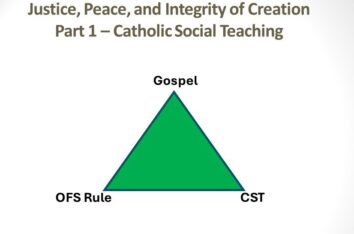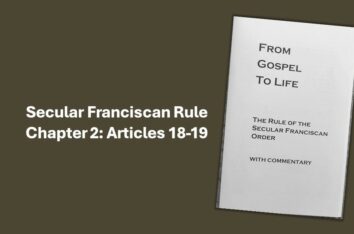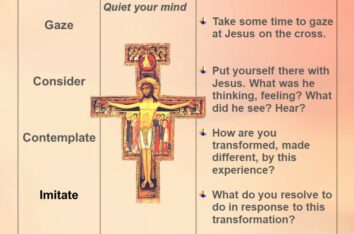Dear Brothers and Sisters,
I remember attending the “Q” in Chicago many years ago. Sr. Illia Dileo, the featured speaker, spoke about Franciscan Spirituality. Her talk was so inspiring. I thought how could anyone not want to be a Franciscan! It is so much about LOVE and how much God has given to us.
Franciscan Spirituality in Seven Steps
“Franciscans view the world and God’s creative presence in a particular way. How we understand this and our relationship to God is at the heart of what we call Franciscan spirituality. The following are key themes in Franciscan theology (how we understand God) and consequently in Franciscan spirituality (how we relate to God). We owe this understanding to the experience of St. Francis first, then to his followers throughout the ages, particularly St. Clare.
1.God is absolute love, being, and creativity. Creation is dependent upon God to exist.
No created thing exists because of its own capacity to be; only God is capable of being without depending on something else. The development of created things through time reflects God’s inexhaustible ability to be creative and to remain the source of demonstrated love.
2.God has freely chosen incarnation (taking on human form) before the human choice for sin.
Jesus Christ comes to us because God loves us, not because we sin. Because of sin, Jesus comes in a particular way out of free will, not because a particular method of human behavior is needed to save us. God can simply will salvation because God is always free. Christ chooses to be with us physically now through the Eucharist until he comes again. This is reflective of God’s willingness to be with us in humble ways and to nourish us physically and spiritually.
3.Christmas is of primary importance to us.
Easter is the outcome of Christmas. The Incarnation is the greatest thing God could do for creation. The death of Jesus on the cross remains a mystery because even given human sin, God was not constrained to act in this unbelievable self-sacrificial way. It was done to attract us to divine love.
4.Christ is the perfect image of who God is for creation.
He is the mirror of who and what all humanity and created things are meant to be. Creatures participate in this perfection to the capacity of their natures. Humans can choose to not participate in Christ. Mary is the human person who has most perfectly chosen to participate in imaging God, both physically and spiritually.
5.Every creature is unique, gifted, and living in relationship.
No human life is a mistake, because everyone is uniquely gifted. The relationships of life are meant to be deepened according to the nature of the creature. This reflects the nature of God, who lives in Trinity and is therefore capable of the greatest depth of relationship.
6.Nothing humans have the ability to do has the capacity to make God do something.
God is always freely choosing love for humanity, even when we don’t see that the choice is the best. Our knowledge is too limited by space and time, while God is not limited by them. We all remain poor at God’s table because God doesn’t owe us anything.
7.Mercy, forgiveness and justification are God’s actions.
They do not result from our actions. We work on our salvation while recognizing that even our capacity to want to do good comes as a gift from God. We must do what we can – the freedom to choose comes from God – but realize that God is behind the ability to do good. God respects our freedom so much that he asks us to cooperate with him.”
This material appears in the FUN Manual chapter: Franciscan Theology, Tradition and Spirituality pp.16-17 of 30, with credit to Fr. Joe Schwab, OFM.
For discussion or to comment on in your journal
+ Each day, choose one of the statements above and spend time thinking about it.
–What influence does it have on your spiritual life?
–How does it affect how you live your Franciscan life?
–How do these statements affect your relationship with God the Father, Son, and Holy Spirit?
++++++++++++++++++
La espiritualidad franciscana en siete pasos
“Los franciscanos ven el mundo y la presencia creativa de Dios de una manera particular. Cómo entendemos esto y nuestra relación con Dios está en el corazón de lo que llamamos la espiritualidad franciscana. Los siguientes son temas claves en la teología franciscana (cómo entendemos a Dios) y, en consecuencia, en la espiritualidad franciscana (cómo nos relacionamos con Dios). Debemos este entendimiento a la experiencia de San Francisco primero, luego a sus seguidores a lo largo de los tiempos, particularmente a Santa Clara.
1. Dios es amor, ser, y creatividad absolutos. La creación depende de Dios para existir.
Ninguna cosa creada existe por su propia capacidad de ser; sólo Dios es capaz de ser sin depender de otra cosa. El desarrollo de las cosas creadas a través del tiempo refleja la inagotable capacidad de Dios para ser creativo y seguir siendo la fuente del amor demostrado.
2. Dios ha elegido libremente la encarnación (tomando forma humana) antes que la elección humana por el pecado.
Jesucristo viene a nosotros porque Dios nos ama, no porque pecamos. Debido al pecado, Jesús viene de una manera particular por libre albedrío, no porque se necesite un método particular de comportamiento humano para salvarnos. Dios puede simplemente querer la salvación, porque Dios siempre es libre. Cristo elige estar con nosotros físicamente ahora a través de la Eucaristía hasta que regrese. Esto refleja la voluntad de Dios de estar con nosotros de manera humilde y de nutrirnos física y espiritualmente.
3. La Navidad es de suma importancia para nosotros.
La Pascua es el resultado de la Navidad. La Encarnación es lo más grande que Dios pudo hacer por la creación. La muerte de Jesús en la cruz sigue siendo un misterio, porque incluso dado el pecado humano, Dios no se vio obligado a actuar de esta manera increíble de autosacrificio. Se hizo para atraernos al amor divino.
4. Cristo es la imagen perfecta de quién es Dios para la creación.
Él es el espejo de quién y qué deben ser toda la humanidad y las cosas creadas. Las criaturas participan de esta perfección en la capacidad de su naturaleza. Los humanos pueden optar por no participar en Cristo. María es la persona humana que más perfectamente ha elegido participar en la imagen de Dios, tanto física como espiritualmente.
5. Cada criatura es única, talentosa y vive en relación.
Ninguna vida humana es un error, porque todos tienen dones únicos. Las relaciones de la vida están destinadas a profundizarse de acuerdo con la naturaleza de la criatura. Esto refleja la naturaleza de Dios, que vive en la Trinidad y, por lo tanto, es capaz de una relación más profunda.
6. Nada de lo que los seres humanos tienen la capacidad de hacer tiene la capacidad de hacer que Dios haga algo.
Dios siempre elige libremente el amor por la humanidad, incluso cuando no vemos que la elección es la mejor. Nuestro conocimiento está demasiado limitado por el espacio y el tiempo, mientras que Dios no está limitado por ellos. Todos seguimos siendo pobres en la mesa de Dios, porque Dios no nos debe nada.
7. La misericordia, el perdón y la justificación son acciones de Dios.
No son el resultado de nuestras acciones. Trabajamos en nuestra salvación, al tiempo que reconocemos que incluso nuestra capacidad de querer hacer el bien es un regalo de Dios. Debemos hacer lo que podamos, la libertad de elegir viene de Dios, pero debemos darnos cuenta de que Dios está detrás de la capacidad de hacer el bien. Dios respeta tanto nuestra libertad que nos pide que cooperemos con él ”.
Este material aparece en el capítulo del Manual FUN: Teología Franciscana, Tradición y Espiritualidad pp.16-17 de 30, con crédito al P. Joe Schwab, OFM.
Para platicar o comentar en su diario
+ Cada día, elija una de las afirmaciones anteriores y dedique tiempo a pensar en ella.
– ¿Qué influencia tiene en tu vida espiritual?
– ¿Cómo afecta la forma en que vives tu vida franciscana?
– ¿Cómo afectan estas declaraciones su relación con Dios Padre, Hijo y Espíritu Santo?
Chair, National Formation Commission


